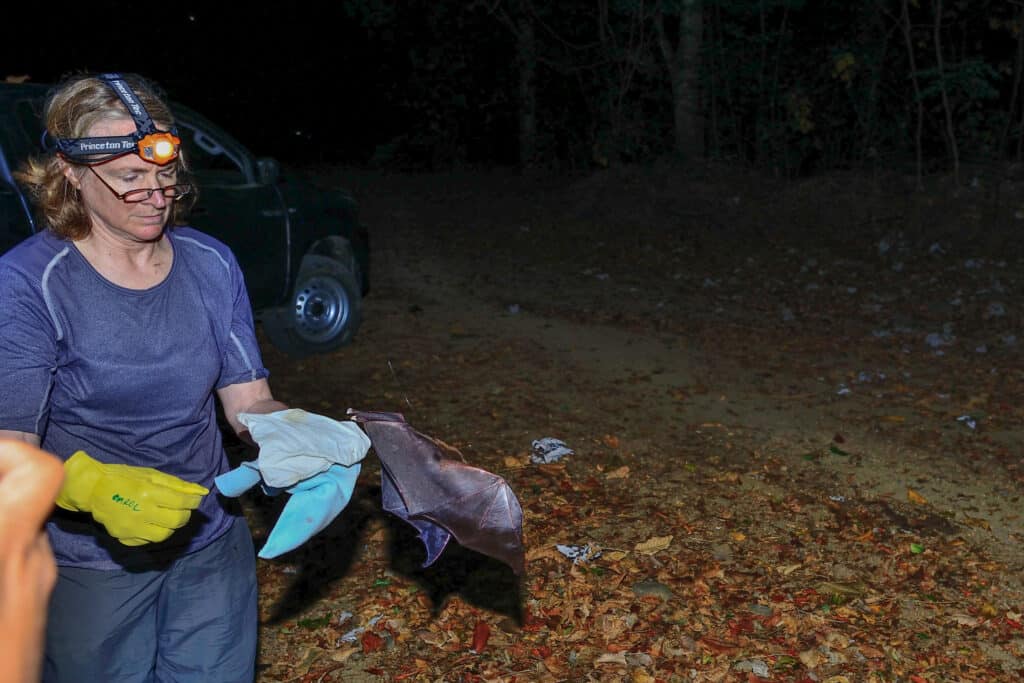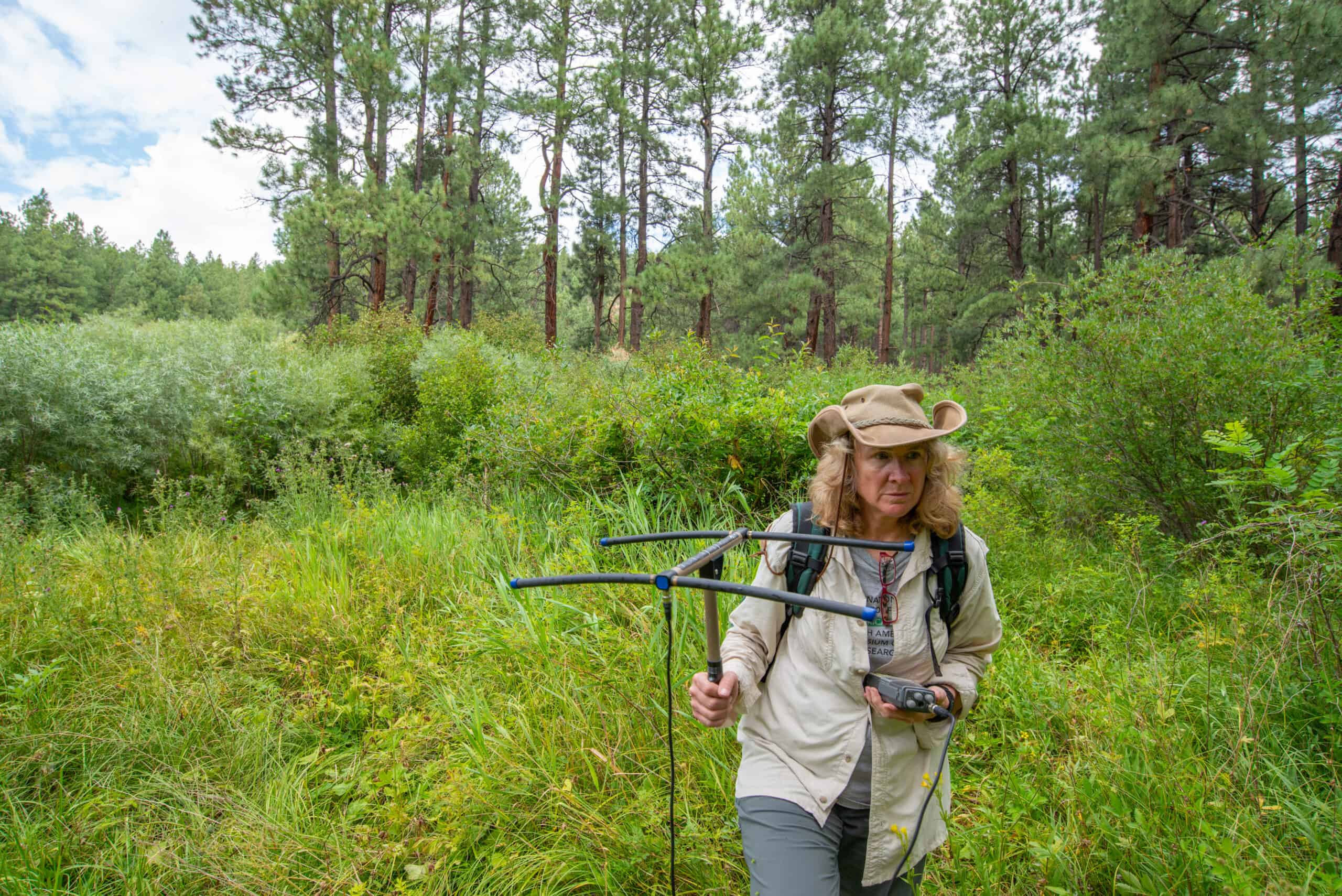Share this article
Carol Chambers earns Aldo Leopold Memorial Award
The former TWS president was praised for her commitment to wildlife—and wildlifers
When Carol Chambers arrived in Nicaragua in 2012, the country had 99 known species of bats. Before she left, she made Phylloderma stenops No. 100.
Since then, the list of bat species she has helped identify in Nicaragua has grown to 111, and her work is expanding to other parts of the country as she and her colleagues explore the impacts of forest fragmentation on the flying mammals.
It’s one of many contributions Chambers has made to conservation, but the most important ones she has made may be less about science than about opening the profession to new generations of researchers that reflect a broader diversity than the one she found when she entered the field.
Those contributions earned her the 2023 Aldo Leopold Memorial Award, which Chambers will receive in November at TWS’ Annual Conference in Louisville, Kentucky. The honor recognizes her lifelong contribution to the field. It comes on the heels of another award she will receive from the Society of American Foresters—the Barrington Moore Memorial Award in Biological Science, recognizing outstanding achievement in biological research leading to the advancement of forestry.
The Leopold award was a surprise, said Chambers, a professor of wildlife ecology at Northern Arizona University and a past TWS president. “I don’t write books that generate new paradigms,” she said.
But her supporters say that’s exactly what she does.
With TWS member Kerry Nichols, Chambers edited the 2022 book Women in Wildlife Science: Building Equity, Diversity, and Inclusion, dedicated to not just celebrating the achievements of women in wildlife science but addressing the challenges and proposing ways for the profession to be more inclusive.
“Carol is doing the difficult work of diversity, equity and inclusion with no road map, and ensuring that our field is welcoming, inclusive and successful in the 21st century,” wrote a group of 10 authors included in the book when they nominated Chambers for the award. “This service to the profession has widened the lens with which we all examine what it means to be a wildlife biologist. It is not just about the wildlife; it is also about the people who do the work.”

Chambers work in the field has ranged from stable isotope analysis to movement patterns of the New Mexico meadow jumping mouse (Zapus hudsonius luteus), and from 40,000-year-old bat mummies in the Grand Canyon to extensive research on the bats of Nicaragua.
“Through the work we’ve been doing in the last 10 years, we have been able to set up the most comprehensive dataset of bat occurrences in Nicaragua, and one of the largest in Latin America,” said Jose Martinez-Fonseca.
Martinez-Fonseca was a park ranger in Nicaragua when he started working with Chambers’ bat research. She encouraged him to pursue his doctorate at NAU, where he is now a postdoctoral researcher with her.
“I had worked with other foreign researchers in the past before I met her, but this was the first time I really felt like this person was not just trying to get her work done and leave with the data,” he said. “She was trying to build capacity and really get us to understand the project and be able to give feedback. That really impressed me from the beginning. She was really good at bringing people with lots of different skillsets from the U.S. and Nicaragua together and really get us to talk and learn.”
Chambers started out in a pre-veterinary program at the University of Kentucky when she realized she more interested in animals in the wild than in an exam room. It came to her naturally. Her maternal grandfather authored the book Forty-Four Years, the Life of a Hunter, the tale of his life harvesting wildlife in western Maryland in the 1800s.
“I just like being outside,” Chambers said. “Every day outside is a better day. There’s something about connecting with the outdoors that’s really important for me.”
She earned her master’s degree at the university’s school of forestry, and after a couple years as naturalist in Kentucky and Virginia, she pursued her doctorate in wildlife sciences at Oregon State University.
“There weren’t a lot of women in forestry at the time,” Chambers said, “and there were things happening that weren’t so great for women. You just become aware of inequities.”
The program had just one female professor on the track to tenure, but that professor held brown-bag lunches for women to build a sense of support among them, Chambers said. When Chambers landed at NAU, she brought that with her.
She demonstrated the same commitment to advancing women in the profession with TWS. In 2010, she helped form the Women of Wildlife group. When she served as TWS president from 2020 to 2021—a term marked by COVID-19—and then as interim CEO, she made expanding diversity a priority.
“We still aren’t representing people of color well,” she said. “How do we reach other people who are not comfortable in the TWS environment yet?”
For her supporters who nominated her for the award, that commitment has helped shape the wildlife profession.
“We have repeatedly seen, firsthand, how Carol’s leadership in the wildlife profession has dramatically changed careers, projects, and people inside and outside of our profession, for the better,” they wrote in their nomination letter. “Her critical mind, creativity, passion for wildlife and wildlifers, willingness to be open and wrong, and her strong moral character have influenced thousands and likely tens of thousands of wildlife professionals and the animals/habitat/systems they work to conserve.”
Header Image: Carol Chambers’s research has ranged from bats in Nicaragua to the New Mexico meadow jumping mouse in the southwestern United States. Credit: Jose Martinez-Fonseca








